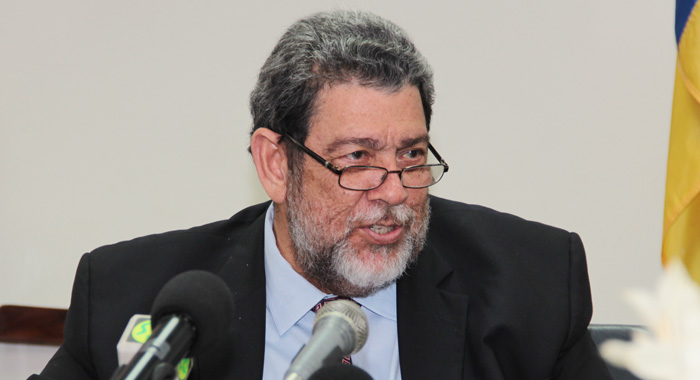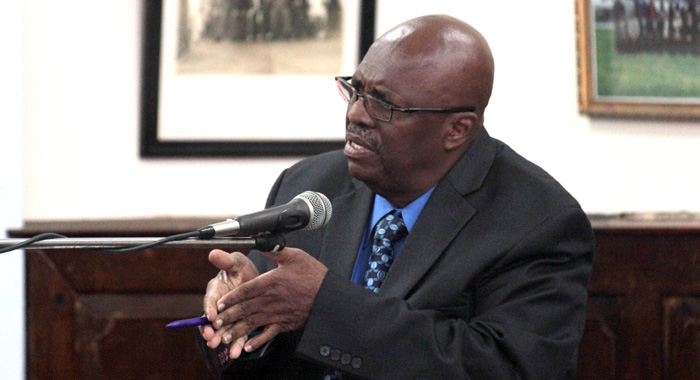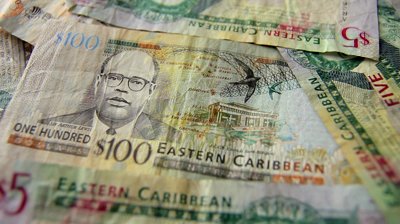Parliament Tuesday evening passed without opposition support a resolution allowing the Ralph Gonsalves government to raise an EC$15 million loan from the National Insurance Fund to liquidate outstanding contributions owed by the Government to the National Insurance Fund.
In presenting the resolution, Gonsalves attempted to assure public workers that their benefits are not at risk, even as his government has not paid workers’ national insurance contributions for at least seven months.
“Nobody’s NIS benefits, no individual’s benefits, is in jeopardy — anybody who work with the government. None! And I think that point has to be made over and over again. What we are involved in here is the management of an indebtedness, and to do so in a manner which contributes, to the NIS’ own sustainability,” said Gonsalves, who has ministerial responsibility for the NIS.
And, Leader of the Opposition Arnhim Eustace told lawmakers that while he understands the government’s proposal, he was also uncomfortable with it.
Eustace said he had information suggesting that the government in fact owes the National Insurance Services (NIS) some EC$23 million, and that the government has not paid NIS contributions since April 2013.
“So, here you have the public servants having had the money deducted from their salaries, but government is spending that money without giving it to the NIS, and so it has been also with government’s contribution. So the full contribution was not paid over, as it should have been,” Eustace, a former minister of finance told Parliament.
“So, any effort you make right now to make that right is going to require that amount being paid by the government and the government gets its money from taxpayers, who are the same people who you deducted the money from in the first case from their salaries. You are asking them to play twice,” Eustace said.
In presenting the resolution, Gonsalves who is also Minister of Finance, noted that the NIS is governed by the National Insurance Act, and offers a series of benefits for employees on the basis of contributions by employer and employees.
He outlined that under the act, an employee much receive benefits from the NIS, if it can be proven that NIS deductions were made, even if they weren’t paid in to the NIS. In addition, the government is the guarantor of the NIS, Gonsalves said.

“In short, the government owes the NIS certain sums of money in respect of the contribution, and rather than have the matter remain as a debt, simpliciter, we have come here in this resolution to raise that sum of $15 million by the issue of Treasury notes, which would be an investment for the NIS to be paid on an on-going basis over a 10-year period at 4.5 per cent,” he said.
Gonsalves said that since the December 2013 floods and landslides (which left EC$330 million or 17 per cent of GDP in loss and damage) his government has been very careful in making sure that it takes care of on-going obligations.
The government should pay monthly to the NIS EC$1.7 million for workers’ contribution to the social security agency.
But Gonsalves said that with declining revenue, the government first ensures that it satisfies the purchase of essential items like drugs for the hospital, and payment of state pensions.
“In the context of the tight fiscal situation, this is a matter where we paid other bills and simply agreed that when we see an uptick to correct this problem, to come to the house, inform the people how we are addressing this matter so that all the NIS payment are up to date,” he said.
He said that from this month, his government intends to pay the EC$1.7 million monthly while repaying the EC$15 million over 10 years.
Gonsalves defended the move by his government, amidst criticisms that a private company would not be allowed such leverage.
That is the case because the private company is not the guarantor of the NIS money, he said, adding that in such a situation, a private firm can arrange scheduled payment with the NIS.
“They (NIS) don’t go about putting people in court,” Gonsalves said.
He said his government would have prefer to pay the EC$1.7 every month. “But since the December crisis, the December disaster — and even little before, but particularly since the December disaster, … we have made sure that you take care of all the immediate essential things,” Gonsalves said.
NIS ‘very liquid’
Gonsalves told Parliament that the NIS is currently “very liquid”.
“That means they have a lot of money, liquid, cash,” he said , adding that 23 per cent of the NIS’ assets are held in the form of money market instruments, which exceed the international benchmark of 10 per cent.
“They have them in instruments, which can be easily converted,” he said.
He told lawmakers the use of Treasury notes to settle contributions means that the NIS would avoid the transaction cost of buying securities on the market, had the government make cash payments.
“… once we get the authority of this Parliament, we intend to have the notes listed on the regional government securities market. This would allow the NIS to easily sell the securities, should there be a need for liquidity before the maturity of these notes,” Gonsalves said.
He said the NIS is “happy” to get the notes at 4.5 per cent interest, rather than simply to have the debt repaid in instalments.
“… in the final analysis, we are the guarantors of everything inside of the NIS. The law says so and practice demands it,” Gonsalves said.
He told Parliament that the notes provide a competitive rate of return, compared to the interest rates and fix deposit, adding that a fix deposit will yield between 0.25 per cent and 3 per cent interest, compared to the government’s 4.5 per cent.
“Incidentally, when settlements are reached with employers, the NIS doesn’t get any money,” he said in reference to private sector entities that do not pay workers contributions, adding that if the NIS does take such an entity to court, the standard interest is 5 per cent.

But Eustace gave Parliament information additional he had about the monies owed to the NIS.
“Today, I see here that the loan being proposed is about $15 million. I have some information that suggests that that should not be all; it should be closer to $23 million. I also have information that suggests that with respect to statutory bodies, there is some withholding of those payments also, amounting possibly to $3 million. And I believe that of the general public, the private sector and so forth, there is another $10 million or so in contributions that have not been paid over to the NIS,” Eustace said, adding that various reasons will be given for the non-payment of these monies.
“If one looked at it in that context, Mr. Speaker, we are talking about $36 million that should have been paid over. That is the issue. It was not, and therefore, there comes a point when, if that were to continue, you could well face the accounts of the NIS being qualified, if one didn’t deal with this issue,” he said, adding that a qualified report would be a serious issue for the NIS to deal with.
Eustace, a former chair of the board of directors of the NIS, said Gonsalves’ presentation was “very nuanced”.
“It doesn’t fool anybody. The reality is that money that was deducted and not paid over and those owed by government itself was not paid over either,” he said.
“What kind of example is the government setting? What kind of example is that to the public of St. Vincent and the Grenadines?
“I know that there are financial difficulties that he government faces; we see it in the financial accounts. There is no question about that. We see it in our widening deficit, no question about that.
“But you come to excuse it here by saying, ‘Oh I had to take that money, don’t pay it in, because the fiscal situation was bad.’
“You must come up with mechanism that don’t make the NIS worst off. That is the fundamental point, that whatever you do, don’t put the NIS in a worse position. People have to get their pensions down the road.
“So, while it might be a good guise to make the presentation the way he made it, the reality is the NIS has to pay. That is the reality. Now, you have a situation which really causing me some difficulty,” Eustace said.
He said while he understands the Prime Minister’s argument he also understands that the nature of the NIS’ operations is a long term one.
“I am not comfortable with the proposal made by the Prime Minister, although I understand it. I feel the NIS should have been paid back the money that is owed to it, and that would have given comfort to those persons who contributed that money.
“We have fiscal problem, yes, but you use some of those monies even before the flood. … What happen to the period May to November 2013? Is that period going to be paid now?” Eustace said.







I am assuming that I read this incorrectly.
Did it say that the government is borrowing EC$15M from the national insurance fund to pay the national insurance fund?
Did it go on to say that public servants NI have not been paid for several months?
Does this not constitute a raid on national assets?
I actually stopped reading this half way through as at that point I had exceeded my recommended daily intake of bull s!@#.
I dont care who you support; if you cannot see the problem here then you deserve to have this happening to you.
Good luck trying to get a state pension in future.
There is another way.
Now is that the way to manage money? If there is only one man who can do that, He is the Prime Minister himself.The man in charge. Leveraging or using other peoples money (OPM) The man is a genius. A Houdini. Robbing Peter to pay Paul.
But wait, there is more. The end is near only if the people of St Vincent and Grenadines not just wake up but open their eyes and see beyond their Big toe. “Wake up People”
SVG may well soon begin issuing new bonds to secure loans to pay our mounting debts. Because we are such a tiny economic player, SVGs credit rating is listed by only one of the three major credit-rating agencies, Moodys, which gives the country a B1 rating.
This is a fairly good grade if you are a schoolboy in short pants. But it is a very poor score in the credit-rating world because B1 means the countrys debt-repayment prospects are considered speculative, meaning there is a high risk of default.
Also called junk bonds, these financial products have to be offered at very high interest rates — well above the 4.5% treasury note level listed in the report — in order to attract high risk-tolerant investors. When sovereign debts or interest on the debts cannot be paid, the whole credit market of the country starts to disintegrate. When poor countries cant borrow money, their people face unimaginable hardship.
Other countries sharing our low rating are hungry places like Lebanon, Papua New Guinea, Mongolia, Senegal, and Sri Lanka.
The only Caribbean islands with a lower rating than SVG are Jamaica and Cuba. (Haiti is not even given a rating, presumably because there is nothing to rate.)
In the Western Hemisphere, three members of the coalition of the willing have even lower ratings than SVG: Cuba, Ecuador, and Venezuela. All deadbeats fighting for the same scraps of food.
This is where the ULP Government is leading us.
May Almighty God have mercy on us all.
This NIS scenario is a Government orchestrated Ponzi Scheme!
Another masterstroke. Thank goodness I am not as smart as the people in government. Wow I am still in shock about what I heard from the likes of Senator Luke Brown, who I knew In grammar school and who hasn’t changed, still confusing himself, and the rest of the government. Fellas, pat yourself on the back, Vincentians home and abroad have now heard first hand the kind of thinking that got our country into this mess. That must be the new style call Dotishnomics.
They said the NIS is healthy but this is the same NIS that had to raise the Age of retirement, Could you imagine that? if the NIS is so healthy then why did they raise the age of retirement? If i had money there the NIS would have had to given me an answer to that. And if you owe the NIS any money go in and barrow a loan from them to pay them, they seem to be more generous with there new payment plans.
I don’t have any money in NIS so I don’t care if it goes under, if you all want to let it go under that is on you. Look at the NCB, that should give you a good idea of what could happen.
Don’t stop now fellas keep the masterstrokes coming, we are being blinded by the light of those master strokes.
Somehow I dont get it. If I owe you $100.00 and I cant pay you and I borrow $100.00 from you to give you the $100.00 that I owe you doesnt it mean that I now owe you $200.00?
Your heart is in the right place, but your maths is atrocious!
If you borrow 100K, you owe 100K
If you then borrow another 100K and take that to repay the first 100K; then you still only owe 100K.
The point is however, that it is a false economy. You have simple refinanced and extended the terms without considering interest or opportunity cost.
The lender is being abused.
There is another way.
ERROL BARROW bluntly callled OECS Prime Ministers “POLITICAL BANDITS” !
If things continue like this, SVG will have to start issuing new bonds to raise money to pay our mounting debts. Because we are such a tiny economic player, SVGs credit rating is listed by only one of the three major credit-rating agencies, Moodys, which gives the country a B1 rating.
This is a fairly good grade if you are a schoolboy in short pants. But it is a very poor score in the credit-rating world because B1 means the countrys debt-repayment prospects are considered speculative, meaning there is a high risk of default.
Also called junk bonds, these financial products have to be offered at very high interest rates — well above the 4.5 percent mentioned here — in order to attract high risk-tolerant investors. When sovereign debts or interest on the debts cannot be paid, the whole credit market of the country starts to disintegrate. When poor countries cant borrow money, their people face unimaginable hardship.
Other countries sharing our low rating are hungry places like Lebanon, Papua New Guinea, Mongolia, Senegal, and Sri Lanka.
The only Caribbean islands with a lower rating than SVG are Jamaica and Cuba. (Haiti is not even given a rating, presumably because there is nothing to rate.)
In the Western Hemisphere, three members of the coalition of the willing have even lower ratings than SVG: Cuba, Ecuador, and Venezuela. Perhaps we should rename our beloved coalition the “gang of deadbeats.”
This is where the ULP Government is leading us.
May Almighty God have mercy on us all.
????? Says, Strange name that, is it Martian? It would appear you are a little confused. They are not taking another loan from them, they will just sit at a table and hand them a treasury bill for the money they previously borrowed when the took the money due to them for NIS payments.
The second payment come in because the employees have allready had their contributions deducted, now there taxs will have to repay the NIS when the bond reaches maturity in ten years time.
I f you cannot understand that try and understand this
If a hen and a half , lay an egg and a half in a day and a half, how many eggs will be laid in a week $2.50? and don’t leave the $2.50 out of the equasion.